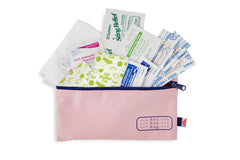MEET SARA: Alaska-Born, Bilingual Mom of Three!

Growing up amidst the breathtaking landscapes of Alaska, Sara embraces her heritage as a second-generation immigrant from Latin America. With a background as a "PK" and a passion for her Hispanic roots, Sara shares insights into her upbringing, bilingual parenting journey, and the joys of raising a family with intentionality and grace.

Nell: I’d love to hear about growing up in Alaska! I don’t often meet people from there.
Sara: I was born and raised in the 907, Alaska-grown and proud of it. And no, I didn’t live in an igloo or see polar bears outside my window, although that second part would have been cool. Ha! Even though I didn’t always appreciate the beauty of living in Alaska when I did live there–mostly because it felt so isolated from the “lower 48” –it truly is the most beautiful state and I feel so blessed to have called Alaska home almost my whole life. After moving to NC only 3 years ago, going back home to visit last summer had me falling in love again with its spectacular nature and simplicity of life there. So if you haven’t visited, book that trip and go!
I also grew up as a “PK” (preacher’s kid), which meant most of my days were spent in church, being involved in leadership at a young age, and learning a lot of tools and lessons that have made me who I am today. Our church was Hispanic (Spanish-speaking), so it helped in developing my Spanish speaking and reading skills that I’m very grateful for. I’m what you would consider a second-generation immigrant, which means I was born in the US, but my parents were born abroad (father - Dominican Republic; mother - Honduras). They immigrated to the U.S. as young adults and met in Alaska (you’d be surprised how many Latinos are in AK!)
N: Were you raised bilingual?
S: Growing up, our house was an “Aquí se habla español” household, meaning my parents did their best to create an environment in our home that fostered Spanish-speaking, embracing our culture, and doing their best in helping us to not forget how to speak Spanish as school-aged kids. We spoke more English at home as we grew up, but we were still fluent in Spanish and spoke to our parents, family, and fellow church members in Spanish. I could not thank my parents enough for the invaluable gift of teaching us Spanish.
N: How did you and your husband meet?
S: We met at a church actually, at a young age. You could say we were “high school sweethearts” in a way. So yes, we were that couple that married young, but I’m happy to say that we will be celebrating our 12 years of marriage this fall and will be a family of 5 in a few short weeks.
N: You’re a proponent of “Slow Living.” What exactly is slow living?
S: To me, slow living means approaching everything with intentionality–not striving for perfection by any means–but having grace and approaching each day with an expectancy for joy in the little things. It is a readiness to serve, to see what gifts lie in front of me and how I can best steward those gifts. It’s finding joy in a simple, slower-paced life, taking things back to the basics, instead of fueling ourselves by taking advantage of every opportunity that exists, which can lead to burnout, but finding joy in rest. It is intentionally putting more effort into spending my time and energy in the things that align with my faith and values, taking pauses in my day to savor the beauty of life (and teaching my children to do the same) as well as the chaos of parenting, home-making, and life with a lens of gratitude and appreciation for what we do have, instead of striving for what the world, or social media, makes you to believe you want.
I think we often miss out on the best gift of being present when we are too consumed mentally to finish the next task, too many commitments, or just being focused on the wrong things that rob us off our joy and peace. So really, living a “slower life” is really just making life less complicated, less rushed, less feelings-driven, and more heart and legacy driven.
I’m not perfect at this, and I am actually learning and walking through this each day, because it is something that requires a lot of effort. As someone who, I have come to find out recently, has serious FOMO, it takes a great amount of effort to live a slower-paced life, and as a soon-to-be mom of three, I am learning that I cannot keep up with the same way of life as I used to. However, I know it’s worth it, because I’m quite tired of being in a hurry and feeling distracted.

N: How would you recommend approaching it for those interested?
S: Reflect on what really matters to you, and focus on creating rhythms in your life that focus on those very things. Remove clutter from your schedules and if you have to, pencil in REST. Allow space on your calendar to do nothing and just rest. I think many of us find this very hard to do, and it takes practice, especially as parents. We, as a family, practice a day of sabbath each week in which we prioritize rest, time with God and time with family. No cleaning or committing to anything that would drain us.
I also highly suggest waking up early to have your quiet time in the mornings before the kids wake up, if possible, to set the pace for the rest of the day to follow.
And lastly, let go of the drive to be perfect in every way, as a mom, as a wife, homemaking, as friend, in your community, or in your career. Try not to let guilt stain the circumstances that you are navigating, and just reflect on what changes you can make, and do your best to do better next time.
RAISING BILINGUAL CHILDREN

N: It may seem obvious, but why choose to raise your children bilingual?
S: I think the biggest drive is in connecting our kids to their culture, history, connecting/bonding with their grandparents/great-grandparents, and simply being able to communicate in the language that we were gifted with. It creates a sense of belonging, but also an awareness and appreciation of diversity and differing cultures.There are so many benefits to speaking Spanish, and so many doors that have been opened for me just for knowing how to speak, write, and read in Spanish, and I would love for my kids to have the same opportunities.
N: There are many approaches to raising bilingual children, what is yours?
S: We do our best to speak mostly Spanish at home. We almost never speak to our kids in English at home, unless we are using English as a learning opportunity, translating, or out with others in public. This can be challenging for us at times because both my husband and I prefer to speak English, but if the kids are around, we opt for speaking Spanish as the best way for our kids to learn. This is especially important for us because our parents don’t live near us, and when we first moved here to NC, we didn’t know anyone that spoke Spanish, so my husband and I were the only ones that our kid(s) would hear Spanish from. We read almost all of our children’s books in Spanish, even if it means translating English books in our head, so that we can read them out loud in Spanish. We watch shows/movies in Spanish almost all the time, and listen to music in Spanish. Of course, a mix of Spanglish often comes out, but I can’t help it. Ha!
Our Spanish isn’t perfect either, but it’s so worth it! I think my Spanish has improved just by speaking it more in the house now and teaching my daughter. And you don’t have to be a native Spanish speaker to teach your children to be bilingual. There are so many resources out there. Both my husband and I speak Spanish, so it is easier for us to raise our children bilingual, even if we get in arguments about which words we want to use (e.g. the Puerto Rican word for stairs, or the Honduran word - I won that one).

N: What advice do you have have for parents who want to raise bilingual children?
N: What are the challenges?
S: For us, it’s seeing a lack of diversity or Spanish-geared events/activities in our community. I often find myself translating things for my daughter so that she can feel included or understand what is happening. However, I trust that what we are doing is worth it, and I have come to see how amazingly well kids learn how to speak the “majority language” (e.g. English) by learning it outside the home without our help, in our community (we thank our church for that).
Finding and building our community of friends that speak Spanish was always very important to me, mostly because I wanted my daughter to feel safe, seen, and able to communicate in the language she felt most comfortable in. Whenever she had the opportunity to play and speak with other kids that spoke Spanish, she was flourished, came out of her shell, and it just warmed my heart to see her feel so connected. It took some time for us to find our community, but I’m so very grateful for the groups/clubs, and friends that have accepted us for who we are and encouraged Spanish speaking at our playdates and in each other’s homes.
We have been lucky enough to go to a local Spanish story time, led by a dear friend, that has allowed us to meet and connect with other bilingual parents and kids. So if you don’t find something like this in your community, don’t be afraid to start one. It’s made the world a difference for us and I’m sure many will be positively impacted.
N: Any favorite bilingual toys, activities or resources to recommend?
S: We are big on bilingual books. I have some of our favorites listed in my Amazon storefront, but you can also find many bilingual books at online shops like Viva Kids Tiendita and Lil’ Libros. We also love our Yoto audio player in our home. It offers a way to reduce screen time while entertaining them through audio read alouds, songs, podcasts and more, with a growing Spanish collection. The Habbi Habbi books are also worth checking out.
SARA + KIBOU

N:Finally, we have to ask: what’s in your Kibou right now?
- Can’t go anywhere without a diaper or two and some wipes.
- Keys
- Driver’s License and Credit Cards
- My handy dandy iPhone
- Chapstick or lip balm
- Honest Hand Sanitizer Spray
- A couple band-aids and antibiotic for the adventurous outings
- Mini travel fan
- Snacks - usually an applesauce for the kids
- An extra onesie or outfit for the youngest





1 comment
Excellent content. I am a witness of the extent vocabulary of the kids when parents teach them to speak Spanish at home. 🥰🥰🥰
Leave a comment